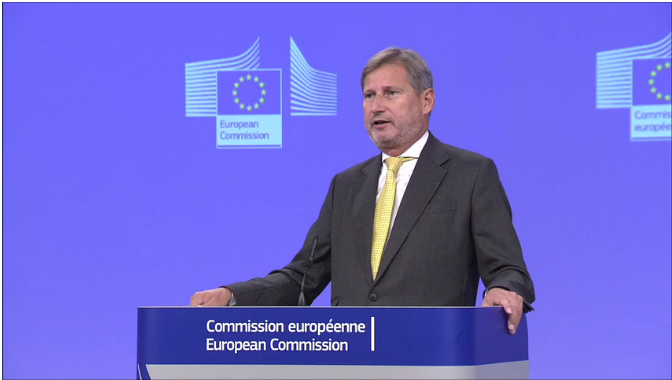Brussels, 17 September 2015
Migration is the defining challenge of this moment. There are 20 million refugees and internally displaced people in our neighbourhood alone.
Our key objective is to help stabilize and to keep the hope of refugees to return to their homes alive.
Let me therefore say a few things about how we are helping through my portfolio.
I want to underline two key principles:
First: Money is crucial but it won’t do the trick alone. We need to use all our policy tools to address the root causes.
Second: we must clearly distinguish between countries, and not throw them into one pot.
- First, there are Syria and its immediate neighbours Lebanon and Jordan;
- Second, there is Turkey;
- Finally, the Western Balkans countries which are not a source of the problem but victims as transit countries.
1. Syria and neighbours:
There is incredible strain on the host communities. Already 4 billion Euros in EU and Member States funding have been spent. But this is not enough! Needs are growing, especially in Lebanon and Jordan. There are already more Syrian kids in school in Lebanon than Lebanese children, with several teaching shifts a day. And we are already keeping hundreds of thousands of kids in school with our aid.
We will do even more and I have already re-routed significant Neighbourhood Funds to these countries. Even more, we need to push those who are not contributing sufficiently (the Gulf countries, but also the US, Canada and those 26 MS who are not paying to Syria Trust Fund while asking us to do more). Because this is a global crisis!
Money, important as it may be, is not the key. We must press for a political solution in Syria. The Commission and other donors can’t keep shouldering the financial burden for years. I will discuss all this with partners in New York during the UN General Assembly.
2. Turkey:
Turkey is a key country for a solution! I have a lot of respect for Turkey’s handling of 2 million refugees (only a minority of which lives in camps).
The Commission has already deployed 175 million of funding in Turkey for migration-related actions including direct aid to refugees.
But I am willing to do much more. I am working hard on the reallocation from other programs ofup to one billion Euros, if Turkey wants and agrees.
This would be done via geographical ring-fencing of our grants to the most affected regions in Turkey, to help with the integration of refugees. It could also take the form of health services, teaching in their language to refugee children and infrastructure support.
I am in contact with my Turkish partners to set this in motion. They are in a tricky pre-election phase. But time is pressing.
At the same time, we need to be clear about what we ask for from Ankara: this is not a one-way street. First and foremost, Turkey needs to be better at registration, readmission and returns. Turkey must be tougher on smugglers and traffickers. We need to have a robust conversation on that. But in general, I am confident we can build a package that reflects our mutual interest to stabilize the situation.
3. Serbia and the former Yugoslav Republic of Macedonia:
Let’s be crystal-clear: the Western Balkans are an enclave in the EU. To get there, a refugee has to walk through at least one Member State. We can’t blame them for lax border controls if our own Member States don’t do their job.
Secondly, we have no interest in adding instability. I just mediated a political agreement in Skopje, which is now being implemented. And while Serbia is making good progress on the road to Europe, we must not overburden them either.
All must shoulder their fair share – and these countries are willing – but the Western Balkansmust not become a parking lot or “no man’s land” for stranded refugees. That would be a gravegeostrategic mistake! Cool heads on all sides are needed now. What we don’t need is harsh rhetoric.
I have already pushed up our assistance for migration-related actions in these nations over the last year (incl. building new reception facilities, training, border controls etc.): about 45 million for Serbia, 24 for the former Yugoslav Republic of Macedonia. And we are ready to shift gear if numbers increase, with quick humanitarian support and also by coordinating experts on the ground.
In conclusion: you see that the Commission is stepping up to the plate in all these countries. We are doing our job! Money is unfortunately an issue, that’s why I am massively re-orienting funds.
But there is only so much the EU can do in tight budgetary times. I want our Member States themselves to chip in more, not least those who constantly call for new “EU Trust Funds” and “aid packages”. Treating European Foreign Policy like a cash machine without saying how they would fill it isn’t helping anyone’s credibility.
But again, most fundamentally, money alone is not the recipe. The decisive thing is to work with our neighbours as part of a wider approach of pan-European leadership, responsibility and burden-sharing, as reflected in the Commission’s overall Agenda for Migration and our concrete proposals of the last weeks. Now we need statesmen and –women, not just politicians.
We have to be careful that there is no new iron curtain coming down in parts of Europe. In my office, I have a small original piece of the iron curtain, as a reminder of our European success story, which only works through mobility.
Link to the video:
http://ec.europa.eu/avservices/video/player.cfm?ref=I108846




